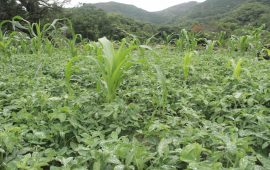Network Background.
The Food Sustainability project in South America and Africa, coordinated by the Center for Development and Environment of the University of Bern (Switzerland) and the Andean-Amazonian Pluricultural Community for Sustainability, responsible for Latin America, plants to support the creation of a Food Sustainability Network.
Within the framework of the VI Latin American Congress of Ethnobiology (VI CLAE), held from September 23 to 28, 2019 in the city of Sucre – Bolivia, organized by the Latin America Society of Ethnobiology, the Andean – Amazonian Pluricultural Community for Sustainability, the Center for Development and Environment of the University of Bern – Switzerland and the Royal, Major and Pontifical University San Francisco Xavier de Chuquisaca as host, the I Meeting (pre – congress) of the Food Sustainability project was held for the creation of the Network of Food Sustainability, analyze its structure, objetives and perspectives. This meeting had the participation of partners from Bolivia, Colombia and Brazil as speaker of their experiences and special guests.
Inthe VI CLAE, one of the thematic lines was Sustainable Food Systems, agroecology and indigenous wisdom for food security and sovereignty, whose conclusions contribute to the objectives of the network and to strengthen sustainability, security and food sovereignty in Latin America.
One of the main results of the pre-congress was the creation of the: Glocal Network for Food Sustainability and Inter-Scientific Dialogue, also committing the efforts of attendees to promote the Network. The Andean – Amazonian Pluricultural Community for Sustainability (COMPAS – Bolivia), took over the Coordination of the Network as the instance in charge of the operationalization.
Outlook and projections
As part of the first actions of the Glocal Network for Food Sustainability and Inter-Scientific Dialogue, a virtual Platform is proposed as a tool that fulfills the role of operationalizing its actions framed in four areas: dialogue and communication between Focal Points, political incidence, dissemination and participatory socialization, transdisciplinary participatory research and continuous biocultural training. Different Latin American universities participate in the Network, as well as other actors (local governments, NGOs, foundations, government organizations, etc.). The approach taken is Transdisciplinarity, the Dialogue of Knowledge and Inter-Scientific.
Virtual platform
COMPAS – Bolivia has the fundamental role of managing and administering the network, which initially concentrates (during the first year), on disseminating and exchanging information and experiences for the evaluation of food sustainability and transformation actions, all this added to the development and implementation of a virtual platform that includes:
. The methodological guide for the evaluation of food sustainability.
. Progress and experiences of the pilot actions for the transformation of food sustainability in South America and Africa.
. Publications on sustainability and food systems in the world, Latin America and Africa: agroecological, agro-industrial and indigenous peasant.
. Publications on inter-scientific dialogue and dialogue of knowledge.
. Videos and short documentaries related to food sustainability, food security and food sovereignty.
. Interaction and contributions of the focal points through the virtual platform with personalized apaces for this, which guarantee the flow of information between the partners and those registered in the network.
. Continuous virtual and blended training, through audiovisual tools developed for the evaluation of FoodSaf sustainability.









